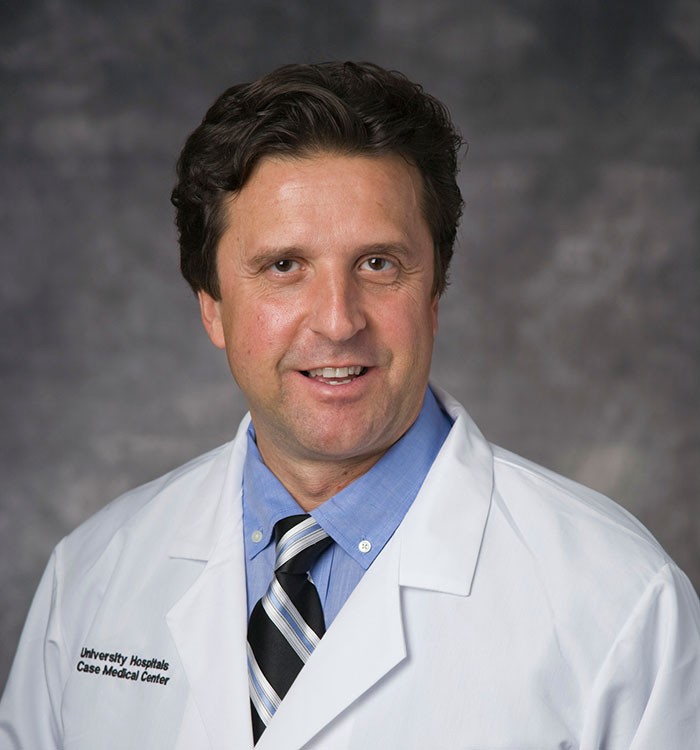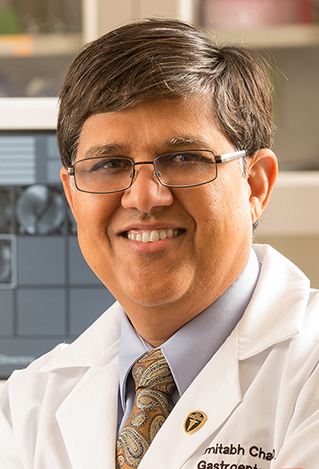University Hospitals Digestive Health Institute Research Initiatives Update
April 01, 2024
Innovations in Digestive Health | Spring 2024
Digestive diseases are a significant and growing health burden worldwide, spurring an urgent need for prevention and novel therapeutic options. At University Hospitals Digestive Health Institute, clinicians and investigators continue to lead the way in this disease field with scientific research and clinical trials to further the collective knowledge and improve patient outcomes.
Digestive Diseases Research Core Center
The Cleveland Digestive Diseases Research Core Center, established in July 2015, was funded by a 10-year grant from the National Institutes of Health (NIH). The center is a multi-institutional, collaborative effort among Case Western Reserve University, University Hospitals, Cleveland Clinic Foundation and the Louis Stokes VA Medical Center.
 Fabio Cominelli, MD, PhD
Fabio Cominelli, MD, PhD“This is a premier program in gastrointestinal research and has had a major impact on research of digestive disorders,” says Fabio Cominelli, MD, PhD, Chief Scientific Officer of UH Digestive Health Institute and Hermann Menges Jr. Chair in Internal Medicine at University Hospitals. “It includes 15 departments, supporting young investigators, piloting feasibility projects and collaborating among numerous institutions in Cleveland in service of a better understanding of these diseases. This grant is up for renewal, and we fully expect NIH to fund the program for an additional five years.”
Barrett’s Esophagus and Esophageal Cancer
 Amitabh Chak, MD
Amitabh Chak, MDThe NIH recently awarded a five-year, $11.2 million grant to study the pathogenesis of — and develop new treatments for — Barrett’s esophagus, a precursor to esophageal cancer. Led by Amitabh Chak, MD, of the UH Digestive Health Institute and Professor at the School of Medicine, and Kishore Guda, DVM, PhD, Assistant Professor at the School of Medicine, this research will focus on the molecular and genetic factors involved in the progression of Barrett’s esophagus to esophageal cancer, a particularly lethal cancer, with a dismal 22 percent relative five-year survival rate.
Gastrointestinal SPORE Program
 Sanford Markowitz, MD, PhD
Sanford Markowitz, MD, PhDThe SPORE program — Specialized Program of Research Excellence — is the cornerstone of the National Cancer Institute’s (NCI) Translational Research Program, which strives to bring novel scientific discoveries into clinical trials through collaborative, multidisciplinary cancer research. Case Comprehensive Cancer Center, an NCI-designated consortium of University Hospitals and Cleveland Clinic, and Case Western Reserve University, is one of only five NCI-recognized SPORE Centers of Excellence in gastrointestinal cancers.
The GI SPORE program is ably led by UH’s Primary Investigator Sanford Markowitz, MD, PhD, Associate Professor at the School of Medicine, Dr. Cominelli says. “Dr. Markowitz is in the process of applying to renew this grant, and, again, we expect the NCI to continue to fund this effort.”
Inflammatory Bowel Disease
More than 3.2 million people in the U.S. suffer from Inflammatory Bowel Disease (IBD) and UH Digestive Health Institute has several important initiatives under way to learn more about this condition.
Artificial sweeteners. Although deemed safe by the U.S Food and Drug Administration, the World Health Organization has raised concerns that aspartame, one of several alternative sweeteners, is a possible carcinogen, especially for liver cancer. In mice studies, aspartame causes gastrointestinal inflammation. Considering artificial sweeteners are in thousands of food products, this potential risk factor warrants further exploration.
“The Crohn’s and Colitis Foundation is funding a very important study to investigate the effects of artificial sweeteners in patients with IBD,” Dr. Cominelli says. “This is a very hot area of research now. Recent reports suggest artificial sweeteners may not be beneficial for patients suffering from digestive diseases and may, in fact, play a role in promoting colorectal cancer.”
Nutritional interventions. Abigail Raffner Basson, PhD, RD, LD, a registered dietitian and Assistant Professor in the Nutrition department at the School of Medicine, is the Primary Investigator in an NIH grant to study the effects of dietary interventions in patients with IBD.
Database studies. “Using TRINETX, a large-scale database at UH, we are looking at the association of medications in patients with IBD and other conditions, including patients affected by COVID-19,” Dr. Cominelli says. “Most of these studies are headed by Dr. Emad Mansoor, Assistant Professor at the School of Medicine. Our research in IBD is one of the strengths of the institute. We cover both basic and translational science and conduct numerous clinical trials in this disease area.”
In addition to these initiatives, UH Digestive Health Institute is studying endoscopic interventions and conducting clinical research with patients affected by liver conditions, including evaluating a new drug for liver fibrosis.
Looking to the Future
“UH Digestive Health Institute is extremely active in a wide range of research initiatives and well-funded by the NIH,” Dr. Cominelli says. “We’re studying conditions that impact many people locally and around the globe, with the ultimate goal of preventing and improving the quality of life and care of patients with these diseases.”
For more information about UH Digestive Health Institute or any of these initiatives, contact Dr. Cominelli at 216-844-7344.
Contributing Expert:
Fabio Cominelli, MD, PhD
Chief Scientific Officer, University Hospitals Digestive Health Institute
Hermann Menges, Jr. Chair in Internal Medicine
Chief, Division of Gastroenterology and Liver Disease
University Hospitals Cleveland Medical Center
Associate Dean for Program Development and Professor of Medicine and Pathology
Case Western Reserve University School of Medicine


